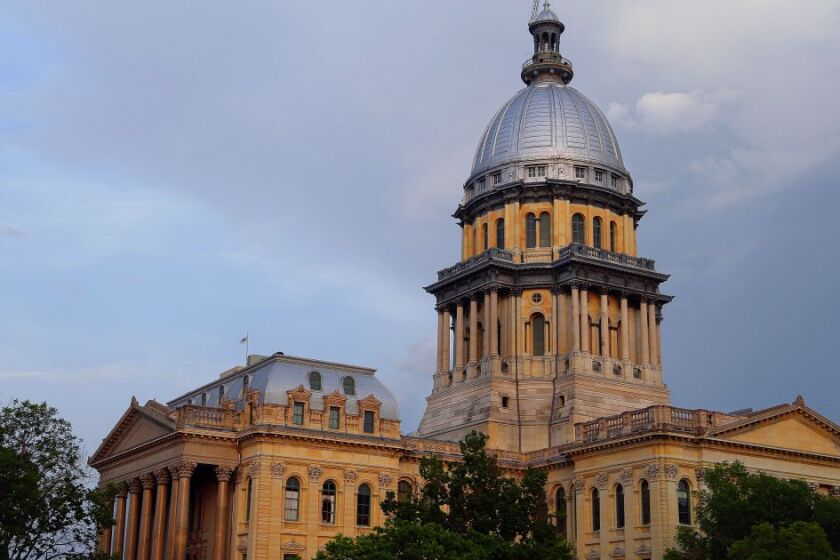Illinois Senate President Don Harmon told public radio talk show host Brian Mackey in late June that some of the most prominent business association leaders had “punched us in the nose” after Senate Democrats devised what he called a “good faith solution” to solve problems created by the state’s super-controversial Biometric Information Privacy Act.
Harmon also claimed the Senate Democratic proposal that the business groups attacked was “very friendly to the business community that has been asking for these changes.”
Companies routinely collect biometric data like facial recognition and fingerprint scans. But in Illinois that’s illegal, unless the companies first obtain informed consent. Lots of lawsuits have been filed as a result, and businesses want relief.
The Illinois Supreme Court all but begged the General Assembly earlier this spring to take another look at the law in its ruling against the White Castle company. That ruling could ultimately cost the burger chain as much as $17 billion for collecting employee fingerprint scans.
The Illinois Retail Merchants Association, the Illinois Manufacturers’ Association and the Illinois Chamber of Commerce held a press conference with other business leaders near the originally scheduled end of the spring legislative session to denounce the Senate Democrats’ proposal in no uncertain terms.
IMA President and CEO Mark Denzler, who has not exactly been known for vitriol, claimed the proposal would make the problem even worse. The legislation, Denzler claimed, “will only increase abuse of this law by trial attorneys” who have filed thousands of claims under the statute.
The three business groups either refused to respond to Harmon’s comments, or, in one case, didn’t respond at all.
Senate President Pro Tempore Bill Cunningham, who helped lead the negotiations and is also not generally known for his temper, said he was even more upset than Harmon after the business groups’ press conference.
He said he reached out to them, and said the Democrats were “trying to draft a pro-business piece of legislation,” and since they claimed the bill would make matters worse, he and the Senate Democrats decided to not run any bill during the spring session and maintain the status quo.
The Supreme Court ruled that the legislative intent of BIPA was to penalize each and every collection of employee biometric information. With large numbers of White Castle employees being scanned several times a day for five years, “that’s how we ended up with a $17 billion” penalty, Cunningham said.
The Democratic proposal would’ve specifically changed the law to base the penalty on the number of employees, not the number of scans. But they also increased the penalty from $1,000 to $1,500, which the business groups denounced as well.
Opponents of the BIPA law claim the original state statute has little to nothing to do with the real world. The idea behind the law is to protect people against having their biometric data stored and even traded without their knowledge or permission. After all, an online password can be changed after a data hack, but people can’t just change their fingerprints to protect their identities.
All true, the critics say, but the fingerprints that are used to verify timecards, etc., aren’t kept or stored after they are scanned. Instead, the fingerprints are immediately converted into a set of numbers using a proprietary algorithm.
“The only biometric information utilized by employers to identify employees is an encrypted string of numbers, systemically created as a result of the mathematical algorithm,” according to a white paper released last week by Littler, a pro-employer law firm. “There is no biometric identifier being stored or disseminated,” and, therefore, “it is virtually impossible to reverse engineer an employee’s original fingerprint.”
Cunningham said he heard a theory from a Republican lawmaker that the business groups have been told by the corporate defense bar that they’re confident they can get the state law overturned by the U.S. Supreme Court, so there was no reason to settle for a compromise at the state level.
“I have no idea if that’s true or not,” Cunningham said, “But it’s a better explanation than I can come up with.”
Another person close to the issue said the Senate Dems ordered the handful of people involved with the talks to not communicate with anyone outside the room. The business groups, this person claimed, weren’t experts on the topic, so it wasn’t until the actual legislation surfaced when experienced business lawyers could see what was going on, and that’s when everything fell apart.
Cunningham said while they took input from others, the “big lobbying groups” were what they were most concerned with.
Rich Miller also publishes Capitol Fax, a daily political newsletter, and CapitolFax.com.
The Sun-Times welcomes letters to the editor and op-eds. See our guidelines.





